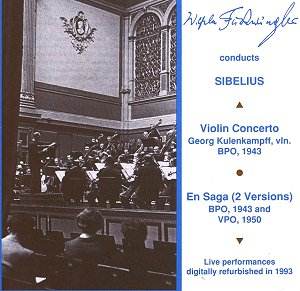Kulenkampff plays up a storm in the Concerto. With
a style like a reckless Oistrakh one is rapidly captivated by this playing.
There are some strange mannerisms, phrasal shapings, agogic adjustments
but one is left with little choice other than to go with the luscious
and perilous flow. Kulenkampf comes to grief once or twice in his almost
salacious vertiginous onrush but he certainly punches the lights out
of most studio versions. This is by no means the only version to have
in your collection but for anyone wanting an antidote to the predictable
this is very special indeed.
There is much more audio damage in the same 1943 concert's
En Saga than in the concerto. In fact M&A's prominent warning
about the sound derived from the Magnetophon tape is hardly warranted
at all in the case of the concerto. The brittle distortion of the first
few bars of En Saga soon dissipates (though returns at 4.30 and
11.07 - always in the difficult though hushed mysterious textures).
Although coarse sounding the subtle weave of the music and its braw
strings-led romance are not sold at all short. Strange quickenings e.g.
at 2.58 may raise the odd eyebrow but this is rattlingly good Sibelius
which is likely to have you asking friends if they have any other Furtwängler
Sibelius. I have just been listening to M&A's 1952 Toscanini En
Saga. The difference is a greater spontaneity and inflammatory tendency
in the hands of Furtwängler. Toscanini is in control and is exciting
but there is more danger and risk-embracing in Furtwängler as in
the smoking accelerations at 16.57. After such magma explosions the
Stockholm version, though a couple of seconds quicker and with some
lovingly scuplted and tender touches (10.43), sounds ... well ... tired
and careful; not a patch on the Berlin concerts of seven years previously.
It was no fault of Sibelius's that amongst non-German
composers his music was played the most frequently in Nazi Germany.
There is a strange sense of place and presence in these documents of
the concerto and the first En Saga both taken down in 1943 at
the Berlin Philharmonie with Germany's foremost orchestra.
Stormingly dug-in Sibelius from Kulenkampf and Furtwängler.
A concerto to put beside the Oistrakh (BMG Melodiya), Haendel (EMI)
and the Julian Rachlin (Sony). Such a pity that Kulenkampf was never
let loose on the Six Humoresques.
Rob Barnett
